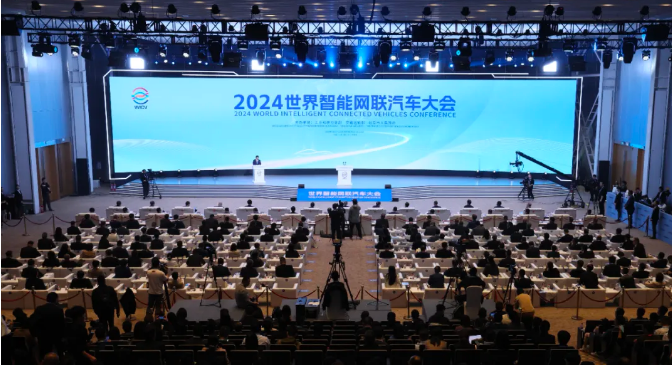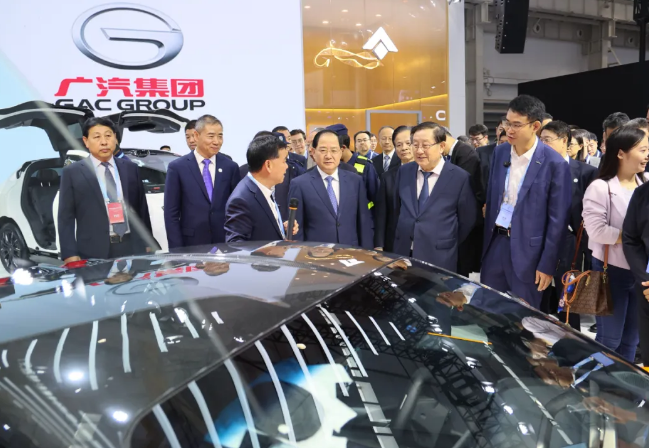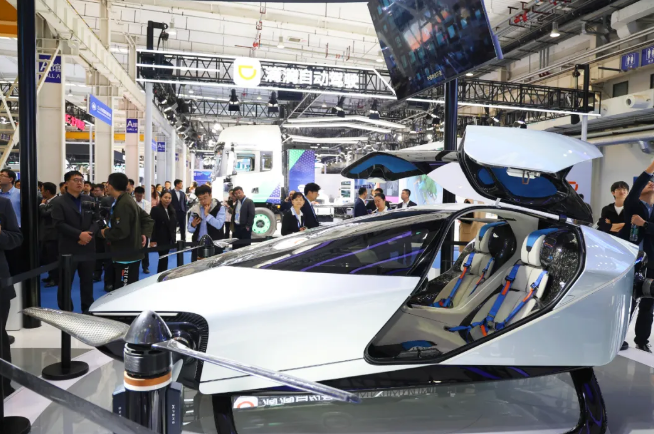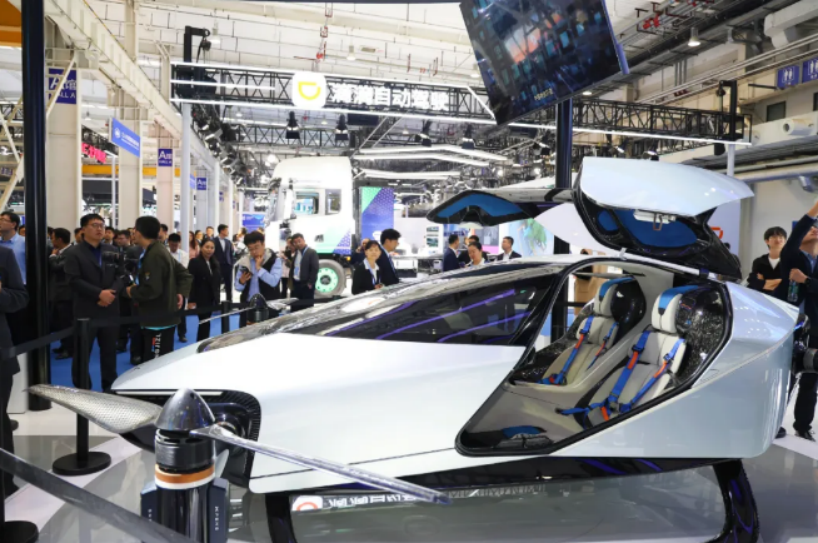2024 World Intelligent Connected Vehicles Conference (WICV 2024) Opens in Beijing
Date:2024-11-05 17:16
Typeface【 Default large Extra large 】

On October 17, the 2024 World Intelligent Connected Vehicles Conference (WICV 2024) opened in Beijing E-Town. Yin Li, Member of the Political Bureau of the CPC Central Committee and Secretary of the CPC Beijing Municipal Committee; Wan Gang, President of the China Association for Science and Technology (CAST); Jin Zhuanglong, Secretary of Party Leadership Group and Minister of the Ministry of Industry and Information Technology (MIIT); and Liu Wei, Secretary of Party Leadership Group of the Ministry of Transport (MOT), attended and addressed the Opening Ceremony. Other distinguished attendees included Marcelo Suárez Salvia, Ambassador of Argentina to China; Siyabonga Cyprian Cwele, Ambassador of South Africa to China; Xin Guobin, Member of Party Leadership Group and Vice Minister of the MIIT; Zhong Zhihua, Member of Party Leadership Group and Vice President of the Chinese Academy of Engineering; Jin Wei, Member of Standing Committee of the CPC Beijing Municipal Committee and Vice Mayor of Beijing; Zhao Lei, Member of the Standing Committee and Secretary-General of the CPC Beijing Municipal Committee; and Gao Dongsheng, Chief Economist of the MIIT. Yin Yong, Deputy Secretary of the CPC Beijing Municipal Committee and Mayor of Beijing, presided over the Opening Ceremony.

Yin Li emphasized that through deepened international exchange and cooperation, the WICV aims to promote the intelligent and green transition of the automotive industry, create smart and efficient mobility, and cultivate new drivers of economic growth. In recent years, Beijing has maximized its abundant innovation resources and accelerated the aggregation of key factors to enhance the ICV industrial ecosystem. Moving forward, Beijing will work with all stakeholders to accelerate its efforts as an international innovation center and a model city for the global digital economy, and create a conducive environment for the global ICV industry. It is eager to drive key technological innovations in critical areas such as automotive-grade chips and perception systems, while strengthening the deployment of forward-looking technologies. Efforts should be made to elevate the industry development by further improving the industry chains in the Beijing-Tianjin-Hebei region and increasing the supply of intelligent computing power, so as to cultivate world-class clusters in the ICV industry. Yin also highlighted the importance of a sound development environment, which requires increasing support in terms of talent, funding, and policy, accelerating local legislation, and fostering a market-oriented, law-based, and accessible business climate in keeping with international standards. Finally, Beijing will deepen international exchange and cooperation, striving for an open, fair, and non-discriminatory trade system that facilitates mutual development and benefits for Chinese and foreign automakers.
Wan Gang emphasized that China’s NEV and ICV sectors have reached impressive achievements over years of development. Going forward, it is imperative to pool national strategic sci-tech resources and market innovators to cultivate and build up new quality productive forces such as new parts and infrastructure. Strengthening industrial collaboration and integration is essential to build a new development ecosystem. We should follow a market-oriented approach to continuously enhance intelligence while promoting cross-region demonstrations and applications across multiple fields. This strategy will help address issues such as imbalances and inadequacies in regional development and technological challenges. Emphasis should be placed on the innovation and industrialization of cutting-edge technologies such as green, low-carbon, and intelligent manufacturing, as well as R&D in artificial intelligence (AI), big data, digital twins, and edge computing. It is also essential to accelerate the comprehensive application of these technologies within the automotive industry. Furthermore, Wan called for deeper global cooperation within the automotive industry. This involves enhancing bilateral and multilateral cooperation platforms to deliver high-quality ICV products that meet the needs of diverse clean energy and environmental protection, ultimately achieving a shared vision of green, low-carbon, safe, and intelligent development.
Jin Zhuanglong noted that the automotive industry is rapidly transitioning towards electrification, connectivity, and intelligence, making it a crucial force in developing new industrialization and new quality productive forces. The MIIT will thoroughly implement the decisions and arrangements of the CPC Central Committee and the State Council, ensuring both high-quality development and robust security. It will formulate plans for developing the ICV industry in the new era, highlighting vehicle-road and hardware-software coordination to accelerate China’s transformation into a leading automotive powerhouse. To this end, efforts must focus on integration and innovation, encouraging collaborative research across automotive, electronics, and software sectors, as well as co-establishment of platforms for autonomous driving data sharing and model training. Application scenarios should be diversified. Further implementation of “vehicle-road-cloud integration” pilot projects will lead to the development of connected facilities with unified architecture and harmonized standards, facilitating wider installation of in-vehicle connected terminals. Standards and regulations need enhancement, with efforts directed towards revising laws and regulations on road traffic safety and insurance, establishing a robust regulatory system for high-level autonomous driving, and accelerating the development of standards for functional safety, cyber security, and data security. Additionally, Jin emphasized the necessity for deepening open cooperation. This includes integrating into the global industry system and enhancing global cooperation on standards and regulations, thereby creating a favorable environment for the global expansion of the industry.
Liu Wei highlighted the deep integration of emerging industries, such as new-generation information technology, AI, and new energy, with transportation. Smart transportation, characterized by intelligent connectivity and autonomous driving, underpins the transition of transportation in terms of quality, efficiency, and power. In this context, we should seize the opportunities from the new round of technological revolution and industrial transformation, to accelerate the digital transformation in transportation, develop new quality productive forces tailored to local conditions, and promote high-quality growth in the sector. Liu emphasized the need to embrace technological progress with a more proactive attitude, promote safe development with more practical measures, and enhance international cooperation with a more open stance. This will drive the development of intelligent connectivity and autonomous driving technologies. The MOT is ready to collaborate with all stakeholders to advance new technologies and industries, such as autonomous driving, and to jointly build a sustainable transportation system that is safe, convenient, efficient, green, economical, inclusive, and resilient. Our goal is to accelerate China’s transformation into a leading automotive powerhouse that ensures economic and social development and people’s aspirations for a better life.
At the Opening Ceremony, Global Top 10 ICVs Breakthroughs were released: Large Model-based AI Technology Achieved Breakthroughs; Integration of Intelligence and Connectivity Becomes a Key Technical Route; Centralized Computing Architecture Enters Industrial Application; Intelligent Chassis Enhances Vehicle Control and Motion Safety; Autonomous Driving Sees Improved Safety Technology Framework; Vehicle-Cloud Closed-Loop Data Transforms Mainstream R&D Paradigm; Combined Driver Assistance (L2) Achieves Large-Scale Deployment; Level 3 and Higher ICVs Experience Accelerated R&D; Major Countries Made Key Advancements in Legislation; and Global Efforts Accelerate the Development of Autonomous Driving Regulatory Standards.

The three-day conference is co-hosted by the Ministry of Industry and Information Technology (MIIT), the Ministry of Transport (MOT), and the People’s Government of Beijing Municipality. Themed “Collaborating for Future Smart Mobility: Embracing New Opportunities in ICV Development”, it features three special sessions, including the International Policy Roundtable, Enterprise Executive Roundtable, and Cross-Regional Collaborative Development Forum, as well as multiple thematic summits, including Collaborative Governance: Improving the Global Industry Regulatory System, Sharing & Co-Creation: Building International Networks for Mutual Benefits, Innovation-driven Growth: Expanding Global Scientific and Technological Cooperation, Integrated Ecosystem: Reshaping the New Industry Development Landscape, Pilot Demonstration: Exploring ICV Development Paths, and Secure Navigation: Ensuring Cyber and Data Security. Additionally, a number of innovative results such as the Global Top 10 ICV Technology Trends, Conference Consensus, and Declaration of Acting in Concert on ICV Vehicle-Road-Cloud Integration will be released. Over 4,000 representatives from governments, enterprises, and research institutions across over 10 countries and regions have registered to attend the conference.

In parallel, the China International New Energy and Intelligent Connected Vehicles Exhibition is being held by the China Council for the Promotion of International Trade Machinery Sub-Council (CCPIT-MSC). Visitors can enjoy an immersive experience of advancements and industrialization in intelligent and connected technologies through static product displays, intelligent driving test competitions, and autonomous driving test rides.
Previous article
Next article